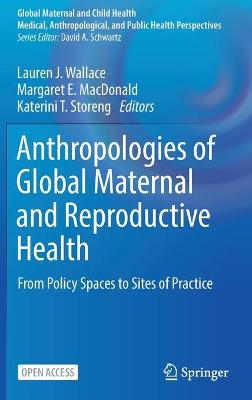(To see other currencies, click on price)
MORE ABOUT THIS BOOK
Main description:
This open access edited book brings together new research on the mechanisms by which maternal and reproductive health policies are formed and implemented in diverse locales around the world, from global policy spaces to sites of practice. The authors - both internationally respected anthropologists and new voices - demonstrate the value of ethnography and the utility of reproduction as a lens through which to generate rich insights into professionals' and lay people's intimate encounters with policy.
Authors look closely at core policy debates in the history of global maternal health across six different continents, including:
Women's use of misoprostol for abortion in Burkina Faso
The place of traditional birth attendants in global maternal health
Donor-driven maternal health programs in Tanzania
Efforts to integrate qualitative evidence in WHO maternal and child health policy-making
Anthropologies of Global Maternal and Reproductive Health will engage readers interested in critical conversations about global health policy today. The broad range of foci makes it a valuable resource for teaching in medical anthropology, anthropology of reproduction, and interdisciplinary global health programs. The book will also find readership amongst critical public health scholars, health policy and systems researchers, and global public health practitioners.
Contents:
Foreword
Craig Janes
Acknowledgements
Chapter 1. Introduction
Lauren J. Wallace, Margaret E. Macdonald & Katerini T. Storeng
Part I. Implementation Disconnects and Policy Rhetoric
Chapter 2. Baby (not so) Friendly: Implementation of the Baby-Friendly Hospital Initiative in Serbia
Ljiljana Pantovic
Chapter 3. The Promise and Neglect of Follow-up Care in Obstetric Fistula Treatment in Uganda
Bonnie Ruder & Alice Aturo Emasu
Chapter 4. The Domestication of Misoprostol for Abortion in Burkina Faso: Interactions Between Caregivers, Drug Vendors and Women
Seydou Drabo
Chapter 5. The 'Sustainability Doctrine' in Donor-driven Maternal Health Programs in Tanzania
Meredith G. Marten
Part II. Policy Ambivalence
Chapter 6. The Place of Traditional Birth Attendants in Global Maternal Health: Policy Retreat, Ambivalence, and Return
Margaret E. MacDonald
Chapter 7. Conflicted Reproductive Governance: The Co-existence of Rights-Based Approaches and Coercion in India's Family Planning Policies
Maya Unnithan
Part III. Contesting Authoritative Knowledge and Practice
Chapter 8. Regulating Midwives: Foreclosing Alternatives in the Policy-making Process in West Java, Indonesia
Priscilla Anne Magrath
Part IV. The Rise of Evidence and its Uses
Chapter 9. Making Space for Qualitative Evidence in Global Maternal and Child Health Policy-making
Christopher J. Colvin
Chapter 10. The International Childbirth Initiative: An Applied Anthropologist's Account of Developing Global Guidelines
Robbie Davis-Floyd
Chapter 11. Selling Beautiful Births: The Use of Evidence by Brazil's Humanised Birth Movement
Lucy Irvine
PRODUCT DETAILS
Publisher: Springer (Springer Nature Switzerland AG)
Publication date: January, 2022
Pages: 220
Weight: 535g
Availability: Available
Subcategories: General Practice, Obstetrics and Gynaecology, Reproductive Medicine

